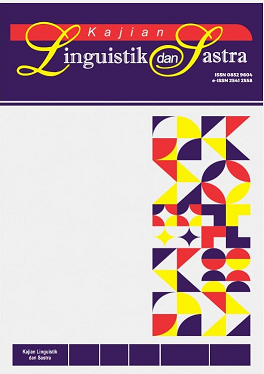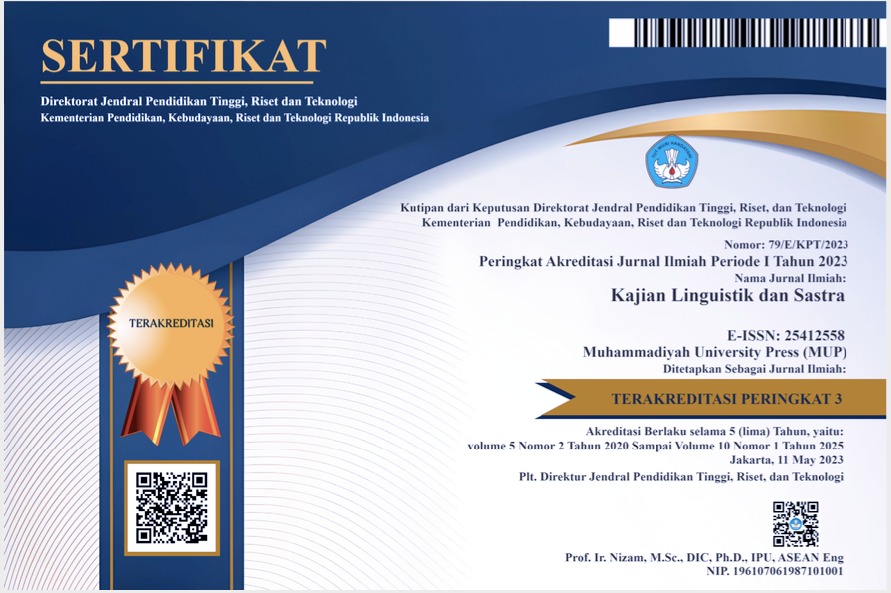Lecturer Insights on Implementing Project-Based Learning at Jambi University
DOI:
https://doi.org/10.23917/kls.v9i2.6936Keywords:
Perception, Project-Based Learning (PjBL), Lecturer, Higher EducationAbstract
This study investigates lecturers' perspectives on Jambi University's implementation of Project-Based Learning (PjBL). The study underlines the significance of PjBL in improving student engagement, critical thinking, and problem-solving abilities, as well as the growing demand for creative teaching strategies in light of the digital transformation of the twenty-first century. Using a qualitative case study approach, the study collected data from 11 lecturers across different language education programs through observations and interviews. Key findings indicate that PjBL is perceived as an effective, student-centered learning method that fosters collaboration and practical problem-solving. The lecturers highlighted the relevance of projects to real-world issues and emphasized the importance of collaboration between students and faculty. Challenges in implementing PjBL were noted, particularly in training, resources, and shifting from traditional teaching methods. Overall, the study reveals that while lecturers recognize the benefits of PjBL, there is a need for ongoing support to maximize its potential in higher education.
Downloads
References
Lucas Education Research, “The Evidence is Clear: Rigorous Project-Based Learning is an Effective Lever for Student Success,” pp. 1–4, 2021.
B. Buhari and U. N. Makassar, “Constructivism versus Cognitive Load Theory : In Search for an Effective Mathematics Teaching,” no. May 2014, 2016.
C. E. Hmelo-Silver, “Problem-Based Learning: An Instructional Model and Its Constructivist Framework,” Instr. a New Gener. Eng., pp. 1–16, 2004.
J. Herrington and A. Herrington, Authentic Learning Environments in Higher Education. Information Science Publishing, 2006. DOI: https://doi.org/10.4018/978-1-59140-594-8
D. Wiliam, “What is Assessment for Learning?,” Assess. Educ. Pract. Ser., vol. 2, 2011.
A. R. Saavedra and V. D. Opfer, “Learning 21st Century Skills: Requires 21st Century Teaching,” Phi Delta Kappan, pp. 94(2), 8–13. DOI: https://doi.org/10.1177/003172171209400203
A. Wiek, L. Withycombe, and C. L. Redman, “Key Competencies in Sustainability: A Reference Framework for Higher Education,” Sustain. Sci., pp. 6(2), 203–218, 2011. DOI: https://doi.org/10.1007/s11625-011-0132-6
E. L. Deci and R. M. Ryan, “The ‘What’ and ‘Why’ of Goal Pursuits: Human Needs and the Self-Determination of Behavior,” Psychol. Inq., pp. 11(4), 227–268. DOI: https://doi.org/10.1207/S15327965PLI1104_01
D. W. Johnson and R. T. Johnson, “Cooperative Learning: The Foundation for Active Learning,” Act. Learn. High. Educ., pp. 20(1), 79–94, 2019. DOI: https://doi.org/10.5772/intechopen.81086
V. Idaresit Akpan, U. Angela Igwe, I. Blessing Ijeoma Mpamah, and C. Onyinyechi Okoro, “Social Constructivism: Implications on Teaching and Learning,” Br. J. Educ., vol. 8, no. 8, pp. 49–56, 2020.
X. Hu, Z. Zhang, and J. Chen, “The Influence of Collaborative Learning on Student Engagement and Academic Performance: A Study of Higher Education,” Educ. Stud., pp. 46(5), 563–580, 2020.
J. W. Thomas, “A Review of Research on Project-Based Learning,” Autodesk Found., 2000.
M. F. Botelho and A. J. Ferreira, “Experiential learning in engineering education,” J. Eng. Educ., pp. 104(3), 1-10., 2015.
K. H. Koh, A. W. Lee, and S. K. Hwang, “Authentic learning environments and project-based learning: Performance assessment integration,” J. Educ. Assess., pp. 27(3), 234-245., 2019.
B. Ozer, “Constructivism and student autonomy: The role of active learning,” J. Educ. Theory, pp. 48(1), 77-91., 2020.
N. R. Council., A Framework for K-12 Science Education: Practices, Crosscutting Concepts, and Core Ideas. The National Academies Press, 2012.
J. Hattie and H. Timperley, “The Power of Feedback.,” Rev. Educ. Res., pp. 77(1), 81–112. DOI: https://doi.org/10.3102/003465430298487
K. Robinson, Out of Our Minds: Learning to Be Creative. Capstone Publishing, 2011. DOI: https://doi.org/10.1002/9780857086549
J. Baer and J. C. Kaufman, “Gender differences in creativity,” J. Creat. Behav., vol. 42, no. 2, pp. 75–105, 2008, doi: 10.1002/j.2162-6057.2008.tb01289.x. DOI: https://doi.org/10.1002/j.2162-6057.2008.tb01289.x
C. Wilcox, “The Role of Student Choice in Writing Instruction,” English J., pp. 104(1), 56–61, 2015.
S. Graham and D. Perin, “A Meta-Analysis of the Effectiveness of Writing Instruction for Students,” Grades 1-12. J. Educ. Psychol., pp. 99(3), 445–476, 2007. DOI: https://doi.org/10.1037/0022-0663.99.3.445
P. Gibbons, Scaffolding language, scaffolding learning: Teaching English language learners in the mainstream classroom. Portsmouth: NH: Heinemann., 2015.
J. D. Bransford, A. L. Brown, and R. R. Cocking, How People Learn: Brain, Mind, Experience, and School. National Academy Press, 2000.
J. Hattie, “Visible Learning: A Synthesis of Over 800 Meta-Analyses Relating to Achievement,” Routledge, 2009.
T. S. Rocco, “Career Preparation in the Writing Classroom: Preparing Students for Success in the Literary Marketplace,” J. Writ. Res., pp. 6(2), 221–248, 2014.
R. Gibbons, “he importance of theoretical frameworks in educational research,” Educ. Res. J., pp. 33(3), 189-201., 2021.
A. Y. Kolb and D. A. Kolb, “The Kolb Educator Role Profile: A framework for reflective teaching,” Learn. Instr., pp. 49, 34-42..
L. Johnson, S. Adams Becker, V. Estrada, and A. Freeman, “NMC Horizon Report: 2016 Higher Education Edition,” New Media Consort., 2016.
G. O’Neill and F. Murphy, “Student-Centered Learning: What Does It Mean for Students and Lecturess?,” 2010.
T. De Jong and A. Van der Meijden, “The Effects of Task Complexity on Collaborative Learning,” Comput. Human Behav., pp. 73, 155–162, 2017.
C. Schmidt, R. Kalb, and S. Krause, “Vygotsky’s theory in modern educational practice: Collaborative learning and student accountability.,” Learn. Instr., pp. 65, 17-29., 2020.
M. O’Leary and D. Coyle, “The Impact of Lectures Experience on the Implementation of Project-Based Learning,” J. Educ. Learn., pp. 7(1), 106–115, 2018.
A. Meyer, D. H. Rose, and D. Gordon, Universal Design for Learning: Theory and Practice. AST Professional Publishing, 2014.










